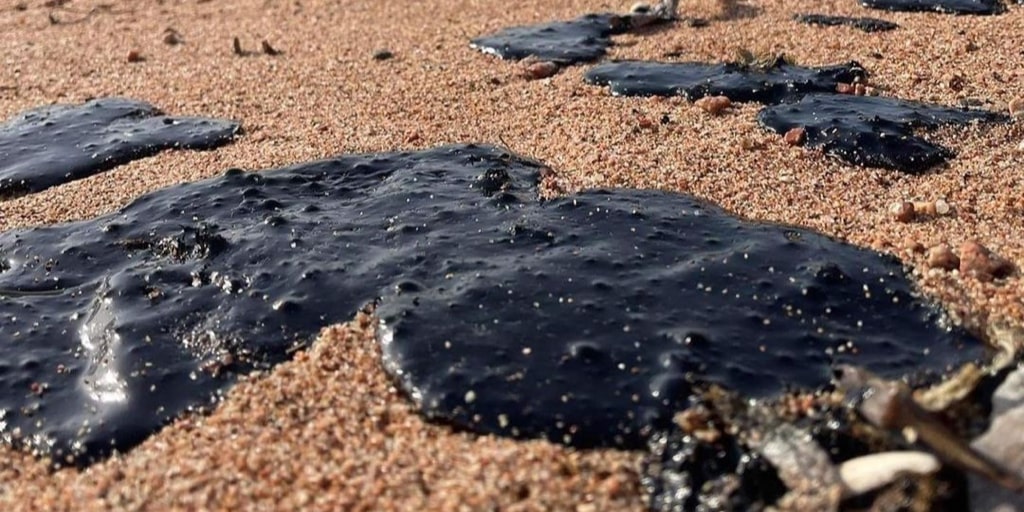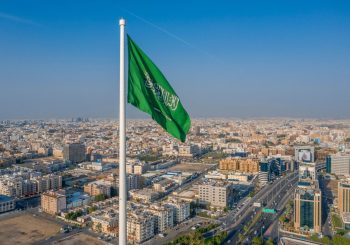Dahab, a small Egyptian town located on the Gulf of Aqaba – bordered by Egypt, Jordan, Israel and Saudi Arabia – has been impacted by a significant oil spill.
Photos of the thick, black tar, coating the beach have circulated on social media, prompting anger among the coastal city enthusiasts.
The source of the oil leakage is currently unknown, but is suspected to be from a spill of crude oil into the Red Sea from the southern coast of Jordan on 15 August.
According to a statement released by the Ministry of Environment on 17 August, the spill has also affected the El-Garden, El-Asla and Zarnouq areas in Dahab, South Sinai.
“We’re analysing a sample of the pollution and identifying the spectral fingerprint to pinpoint the culprit and take legal measures,” stated Minister of Environment Yasmine Fouad, who added that oil waste containment efforts were underway, with four tons of oil waste already recovered and transposed to a landfill.
In Dahab, residents, tourists, and local organizations have come together to clean up beaches impacted by the oil spill. Organizations such as Eco-Dahab, a small sustainable destination management organization, and the free-diving club, Dahab-Freedivers, are among those supporting and leading the clean up.
Nadia Negm, an Dahab resident, tells Egyptian Streets that no one in town seemed to be aware of the oil spill until the tar reached the coast.
“I was on a walk at 6 AM yesterday and I saw dogs covered in tar…there were these huge blotches of tar on the beach and by 7 AM, everyone knew that there was an oil spill. There was barely any coverage on the news, so we didn’t even realize that something like this had happened.”
Along with the governmental efforts, Eco-Dahab is organizing cleanups at meeting points and coordinating with the national reserves and city council for the removal and disposal of the oil. The town’s residents have also created a WhatsApp group urging people to join the efforts.
Negm is just one of a number of volunteers helping out. To date, more than four tons of oil waste has been collected by volunteers, said Eco-Dahab to Egyptian Streets, which added that more than 30 volunteers have been working on the cleanup.
“People, specifically residents and tourists, are going to beaches and grabbing pairs of gloves from a dive club to pick up the tar. Slowly, people walking by started helping out, bringing gloves and big buckets for us to put the oil in,” Negm told Egyptian Streets.
An oil spill is a petroleum leak on the surface of waters and coastal areas, with highly concentrated with toxic chemicals; a spill can cause major environmental damage and harm to both animals and people.
Crude oil contains volatile organic compounds (VOCs), which evaporate into the air and are acutely toxic when inhaled, potentially cancer-causing. Without government agencies or wildfire services to clean up the oil spills, residents in Dahab could be exposed to dangerous toxins and are put at risk to toxic pollution.
Cleaning up oil spills requires specialized equipment like a wide range of booms, pumps, oil skimmers and dispersant chemicals, none of which Dahab residents have. There are also necessary precautions to prevent the contraction of respiratory illnesses, such as wearing protective gowns, gloves, face shields, and facepiece respirators with an organic vapor (OV) cartridge. A facepiece respirator provides eye protection from exposure to gasses and vapors.
“[Residents are] wearing shorts and a T-shirt, rubber kitchen gloves, some shovels – and if you don’t have a shovel, you’re carrying the tar with your hands and putting it into large plastic bottles,” Negm says.
“I’ve seen some authorities and security guards by the beach, but none of them are helping out or even telling us to stop or [not to pick it up asit is toxic] and it is, but we’re so desperate to get the beach cleaned.”
The area’s residents are cleaning their now-contaminated dogs with dishwashing soap; while the latter appear to be out of danger, the tar is difficult to remove. Negm also admitted that she, as well, has oil stuck on her skin.
A few residents have already exhibited symptoms of health issues caused by oil spills. A person exposed to an oil spill can be affected in several ways; among symptoms of exposure are nausea and vomiting, chest pain, skin injuries, and eye sores.
Negm herself experienced a number of those symptoms, namely dizziness and fatigue.
She also explains that, although the spill is relatively small, it is still detrimental to Dahab’s wildlife, tourism, and residents’ health.
“The impact it will have [on Dahab] is massive because we have coral reefs and a very fragile ecosystem in Dahab.This is the lifeline for people […]people from all over the world come to see the Blue Hole and to dive in Islands or Gabr El Bint.All these areas will be damaged,” Negm explains.
The oil spill may also affect Dahab’s role as a transit stop to the other side of the Gulf of Aqaba. The town is an alluring area on the southeast coast of the Sinai Peninsula in Egypt, and is one of the Red Sea’s top diving resorts, known for its natural attractions. Dahab is surrounded by coral reefs and flat turquoise waters that attract tourists from all over the world.
Thus, this environmental calamity, if not properly taken care of, may impact Dahab’s tourism, with a straining effect on the local economy.
Like many other residents of Dahab, Negm is anxious over the fate of her town in the wake of the spill, and frustrated at the fact that not many appear to be listening. If the spill had taken place in the West or another part of the world with a more prominent place in international news cycles, she believes it would be treated with more urgency.
“It is disappointing that an oil spill has to be catastrophic, like the one in the Gulf of Mexico in 2010, for it to be taken seriously and gain media coverage.”







Comments (0)